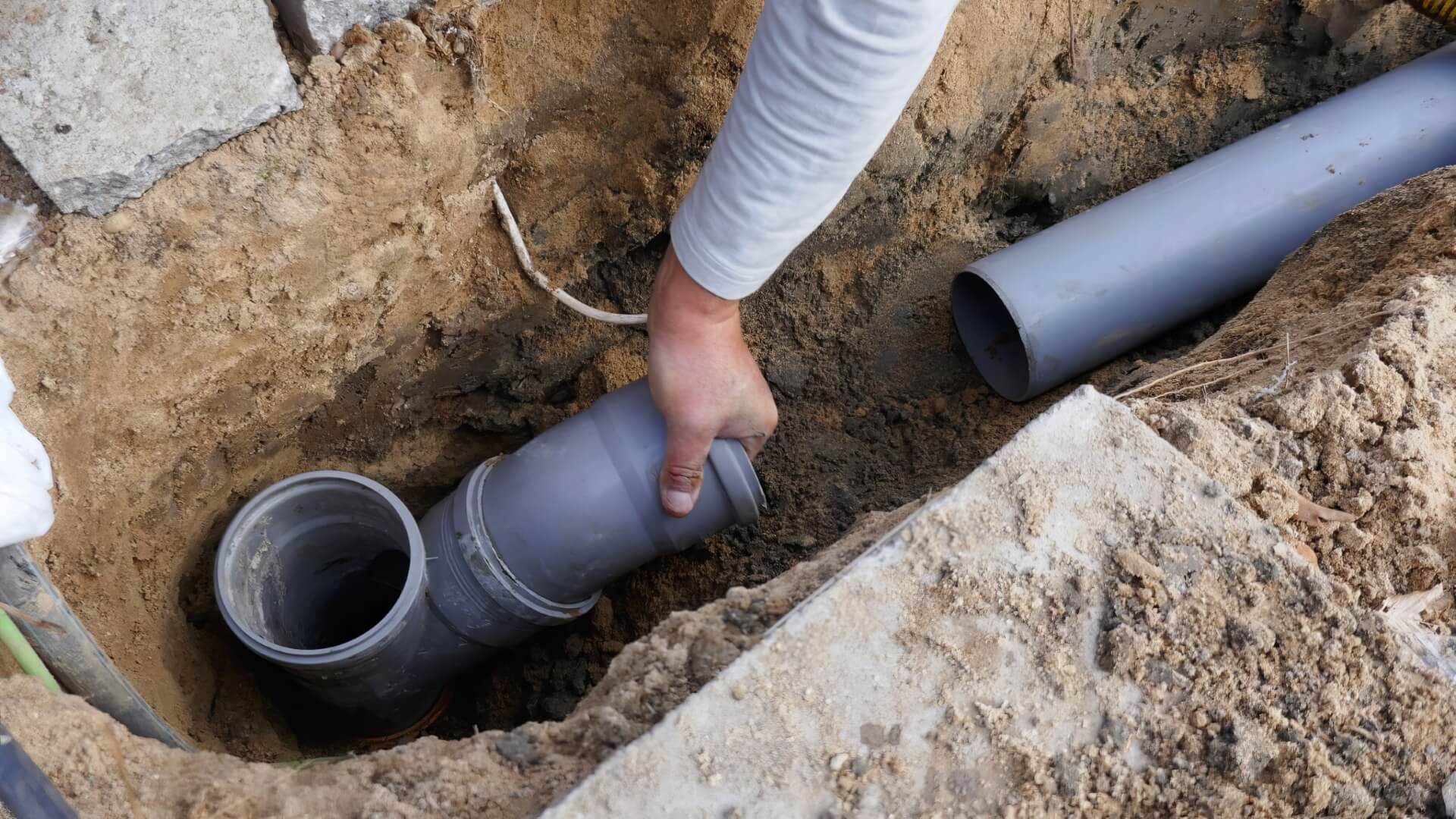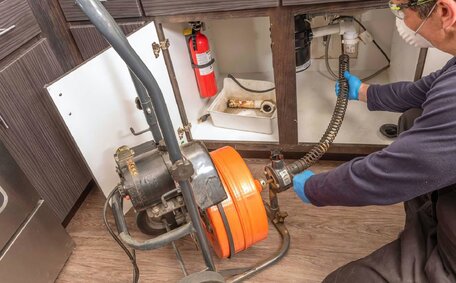Understanding Blocked Drains: Causes and Prevention
Blocked drains frequently disrupt homes and commercial establishments. A blockage happens when substances such as fat, oil, hair, and debris clog your pipes, impeding water flow.
In households, the most common drain blockage causes are:
- Fat, oil, and grease hardening in pipes over time
- Soap scum and hair contributing to a blocked shower drain
- Tree roots invading and obstructing sewer pipes
- Flushing unsuitable items down the toilet
Additionally, in commercial environments, blockages can arise from inappropriate disposal of food waste and paper towels down sinks.
To prevent blocked drains, rely on proper use and maintenance of plumbing:
- Fit sinks and showers with drain screens or hair catchers
- After cooking, dispose of grease and oil in containers meant for safe disposal
- Never flush wipes, sanitary products or any non-degradable items down toilets
- Regularly use a drain cleaning solution to remove debris and maintain water flow.
Unresolved drain blockages can cause serious plumbing damage from leaks, mould from stagnant water, and sewage backups. If a drain is not functioning properly, contact a qualified plumber promptly.
Do’s for Preventing Blocked Drains
When it comes to drain health, it’s important to be proactive to help safeguard the plumbing in your entire home. Simple habits like these make a difference:
- Install drain screens or hair catchers on sinks and showers to capture debris.
- Dispose of cooking oil and fat by letting it solidify and then tossing it in the trash.
- Choose liquid hand soap to minimise residue build-up.
- Compost food scraps rather than grinding them in garbage disposal units
- Only send toilet paper and waste water down the toilet to prevent clogs
Schedule yearly drain inspections as a preventative measure. Professionals can spot issues early, remedying problems like a blocked sewer, and offer drain care advice tailored for your home.
Don'ts that Can Lead to Blocked Drains
Incorrect habits commonly cause blocked drains. Avoid these common mistakes:
- Flushing wipes, paper towels, hair, sanitary items or other solids down toilets
- Using excessive amounts of toilet paper
- Pouring household chemicals like bleach or cleaning solutions down drains
- Letting soap scum, hair and food debris accumulate over time
- Disregarding slow drainage, which often precedes blockages
These convenient but harmful practises allow materials to accumulate and solidify within pipes. Fat and oil congeal as they cool; items like wipes and paper towels don’t dissolve; hair and soap remnants trap other passing debris.
The best way to avoid blocked drains and their costly consequences is through regular maintenance. Blockages can lead to foul odours in homes, damage from leaks and mould, septic backups, and expensive repairs if neglect continues. Avoid creating preventable blockages with smart habits.
Signs of a Blocked Drain Emergency
Blocked drains can rapidly escalate into emergencies if left unchecked. Watch for these common warning signs:
- Water accumulation around drains or toilets, signalling possible complications for both water and gas infrastructure
- Gurgling sounds from sinks or tubs
- Noticeably sluggish water drainage
- Foul sewage odours inside
- Leaks around hot water pipes and drains
- Toilets backing up with waste
These symptoms suggest partial or full blockages. Materials like hair, grease and debris are likely clogging pipes. Trapped solids increase pressure, preventing water from draining.
Don’t ignore subtle early signs. Slow drainage often worsens over days or weeks unless pipes get cleared. A main sewer line, when drain blocked, can reverse the flow of waste through interconnected drains.
If faced with standing water or sewage odours, don’t hesitate to call emergency plumbing services. Timeliness prevents overflow damage. Professional hydro jetting can clear even severe accumulated blockages.
Immediate Actions for Blocked Drain Emergencies
A blocked drain emergency requires prompt and careful action. Assess risks before attempting to clear any blockages yourself. DIY methods like plunging can dislodge trapped debris and get water flowing again.
Safe First Steps
Begin by locating the affected drain. Check all fixtures by running water for a minute in sinks, showers and tubs. If water drains slowly or begins pooling, you’ve identified the problem area.
Examine the area for any signs of water overflow and check around the pipes for leakage.
What do you do before beginning any clearing attempts? Ensure safety by:
- Turning off electricity at the mains if leaks are near electrics
- Wearing long rubber gloves up to the elbow for protection
- Keeping small children and pets away from the affected area
Minor Blockage Clearing Solutions
Use a plunger on partially blocked sinks, tubs, or showers to forcibly free jammed debris. Make sure to seal off the overflow hole fully when plunging to build necessary pressure.
Boiling water can liquefy and disperse grease or fat deposits. Carefully pour a full kettle of hot water directly into the drain. Avoid splashing risks.
A baking soda and vinegar mixture can also chemically break down some types of blockages. For blockages, sprinkle half a cup of baking soda followed by vinegar, then a cup of heated white vinegar to trigger a foaming reaction.
Repeat these methods a few times for stubborn drain issues. Still no improvement? Call a 24/7 emergency plumber to prevent major property damage from uncontrolled blockages.
When to Call a Professional Plumber
If DIY attempts fail to restore drainage within 15-20 minutes, contact a professional plumber immediately. Continuing alone risks worsening the situation.
Seeking expert assistance is especially crucial for:
- Total blockages with standing water or sewage backup
- Clogs affecting main sewer lines
- Early signs of drain issues going unresolved over days/weeks
- Leaks, water damage or foul odours emerging
- Toilet overflows from blockages
- Dishwasher, sink or tub water pooling around the base
Our licenced plumbers at Drummoyne Plumbing have the high-pressure jetting tools and skills to clear any drain blockage quickly. Available 24/7 for emergencies throughout Drummoyne, we prevent plumbing catastrophes through rapid response.
For rapid aid with a Sydney blocked drain, contact the most trusted drainage specialists at Drummoyne Plumbing on 1300 349 338 or email us about any blocked drain concerns.
What a Professional Plumber Will Do
When you call a professional plumbing company like Drummoyne Plumbing for a blocked drain, they will despatch licenced plumbers to assess and resolve the issue promptly and properly.
Upon arrival, the plumber will visually inspect all sinks, showers, tubs and toilets in the home to diagnose the drain location. They ask questions to understand usage habits and any changes preceding the blockage. When comes time to assess widespread plumbing issues, multiple affected fixtures often signal a main sewer clog.
Plumbers use high-tech equipment to internally examine drains. A small CCTV camera manoeuvres through plumbing gas pipes, transmitting realtime video. This reveals the obstacles within pipe systems for targeted clearing.
For kitchen sink drains, plumbers manually feed metal snakes to forcibly dislodge debris. High-powered hydro jet drain cleaners are used for tougher shower or toilet blockages - pressurised water propels through to dissolve materials.
To address blockages caused by hard deposits, chemical drain cleaners containing lye or sulphuric acid may be used. Any remaining water is pumped out prior.
With flow restored, plumbers inspect the full system to ensure no residual obstructions remain. They guarantee an unhindered flow water down drains, free of any gurgling sounds. Any leaks around joints or fittings are addressed before completion.
The experts provide drain care advice customised to the scenario, like installing hair catchers or avoiding disposal misuse. Scheduling semi-annual maintenance cleans prevents repeat issues.
Calling professionals like Drummoyne Plumbing prevents damage from improper DIY drain clearing. Their expert diagnosis also rules out underlying faults within your plumbing system that may require complex repairs later.
Costs of Clearing Blocked Drains
The cost of hiring a plumber to clear a blocked drain depends on several factors:
- Type of drain: Clearing sinks or showers is simpler than toilets or main lines
- Blockage severity: Partial clogs are quicker than complete blockages
- Clearing method required: Snaking vs hydro jetting
- Time and labour: Rates per hour and number of plumbers needed
Expect to pay around $150-$300 for minor sink or shower drain clearances, while complex hydro jetting for main lines or sewers may exceed $500-$1,000, with higher rates applicable for weekend or emergency services.
The total bill reflects site visit fees, materials, equipment rental and time spent. Accurate quotes come after inspection reveals the full situation. Continued neglect makes eventual clearing costs rise exponentially.
At Drummoyne Plumbing, our typical emergency blocked drain service starts from $199. This includes specialist diagnosis, attempts to clear the immediate clog and advice on preventing future blockages.
Maintaining Drains after an Emergency
After having a blocked drain emergency cleared, it’s crucial to implement preventative maintenance so issues don’t recur. Consider the following drain care tips:
Inspect and Clean All Drains
Weekly clean sinks, showers, and tub drains to clear out hair, soap scum, and debris.
Pour Water Weekly
Weekly pour boiling water down each drain to dissolve grease and fat.
Use Enzyme Cleaners
Use enzyme-based drain cleaners regularly to break down organic matter and prevent clogs.
Avoid Harmful Habits
Avoid habits that cause blockages, like disposing of fats in sinks or flushing non-degradable items. Correct use of drains drastically reduces risks.
Inspect Annually
Have plumbers thoroughly inspect all drains once a year using camera technology. They’ll clear any trouble areas and assess if repairs like pipe relining are needed.
Remain vigilant after emergencies, ensuring complacency doesn’t introduce new risks. Implementing these measures keeps plumbing flowing smoothly.






